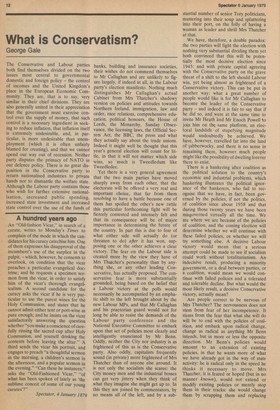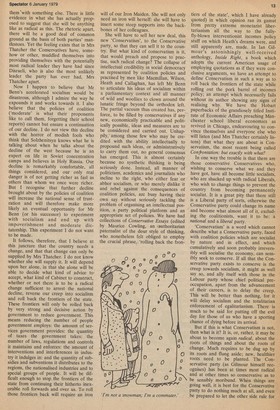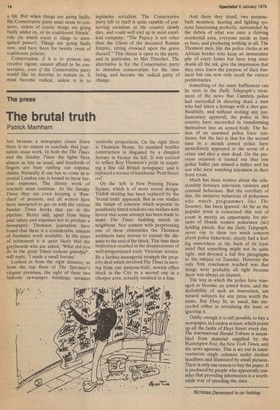What is Conservatism?
George Gale
The Conservative and Labour parties both find themselves divided on the two issues most central to governmental domestic and foreign policy — the control of incomes and the United Kingdom's place in the European Economic Community. They are, that is to say, very similar in their chief divisions. They are also generally united in their appreciation that the government must exercise control over the supply of money, that such control is a necessary ingredient in seeking to reduce inflation, that inflation itself is extremely undesirable, and, in particular, is more undesirable than unemployment (which it is often unfairly blamed for creating), and that we cannot spend our way out of recession. Neither party disputes the primacy of NATO in our defence policy. There is no great disposition in the Conservative party to return nationalised industries to private hands nor to dismantle the welfare state. Although the Labour party contains those who wish for further extensive nationalisation, increased public spending, increased state investment and increased state control over the use of the funds of banks, building and insurance societies, their wishes do not commend themselves to Mr Callaghan and are unlikely to figure largely, if indeed at all, in the Labour party's election manifesto. Nothing much distinguishes Mr Callaghan's actual Cabinet from Mrs Thatcher's shadowy version on policies and attitudes towards Northern Ireland, immigration, law and order, race relations, comprehensive education, political honours, the House of Lords, the Monarchy, Sunday Observance, the licensing laws, the Official Secrets Act, the BBC, the press and what they actually say about the trade unions. Indeed it might well be thought that this year's general election will count for little, in that it will not matter which side wins, so much is Tweedledum like Tweedledee.
Yet there is a very general agreement that the two main parties have moved sharply away from each other, that the electorate will be offered a very real and important choice, that far from them resolving to have a battle because one of them has spoiled the other's new rattle this particular forthcoming fight will be fiercely contested and intensely felt and that its consequence will be of major importance in determining the future of the country. In part this is due to fear of what either side will actually do (or threaten to do) after it has won, supposing one or the other achieves a clear victory. The fear on the Labour side is created more by the view they have of Mrs Thatcher's personality than by anything she, or any other leading Conservative, has actually proposed. The conservative fear is more substantially grounded, being based on the belief that a Labour victory at the polls would necessarily be accompanied by an emphatic shift to the left brought about by the new Labour MPs, and that Mr Callaghan and his praetorian guard would not for long be able to resist the demands of the Labour party conference and the National Executive Committee to embark upon that set of policies most clearly and intelligently enunciated by Mr Benn. Oddly, neither the City nor industry is as frightened of this as is the Conservative party. Also oddly, capitalists frequently sound (in private) more frightened of Mrs Thatcher than of anyone else around. It is not only the socialists she scares: the City money men and the industrial bosses can get very jittery when they think of what they imagine she might get up to. In this they are joined by commentators, by no means all of the left, and by a sub stantial number of senior Tory politicians, muttering into their soup and spluttering into their port, on the folly of having a woman as leader and shrill Mrs Thatcher at that.
We have, therefore, a double paradox: the two parties will fight the election with nothing very substantial dividing them yet both convinced that this will be potentially the most decisive election since 1945: and with private capital agreeing with the Conservative party on the grave threat of a shift to the left should Labour win, yet being almost as frightened of a Conservative victory. This can be put in another way: what a great number of people would like is for Mr Callaghan to become the leader of the Conservative party — and indeed it is fair to say that if he did so, and were at the same time to invite Mr Heath and Mr Enoch Powell to join him on the same platform, an electoral landslide of stupefying magnitude would undoubtedly be achieved. We have, however, travelled far into the land of jabberwocky, and there is no sense in remaining there, however much people might like the possibility of dwelling forever there to exist.
There is a hankering after coalition as the political solution to the country's economic and industrial problems, which hankering illustrates the political ignorance of the hankerers, who fail to recognise that we have, in fact, been governed by the policies, if not the politics, of coalition since about 1958 and that during those twenty years we have been misgoverned virtually all the time. We are where we are because of the policies of coalition, and the coming election will determine whether we will continue with these failed policies, or whether we will try something else. A decisive Labour victory would mean that a serious attempt could be made to see if socialism could work without totalitarianism. An indecisive result, producing a minority government, or a deal between parties, or a coalition, would mean we would continue with failed policies and a tolerated and tolerable decline. But what would the most likely result, a decisive Conservative victory, actually mean?
Are people correct to be nervous of Mrs Thatcher? The nervousness does not stem from fear of her incompetence. It stems from the fear that what she will do will be to end with the policies of coal ition, and embark upon radical change, change as radical as anything Mr Benn intends, but in more or less the opposite direction. Mr Benn's policies would amount to an extension of existing policies, in that he wants more of what we have already got in the way of state activity: he is radical only in the speed he thinks it necessary to move. Mrs Thatcher, it is feared or hoped (but in no manner known), would not extend or modify existing policies or merely stop them in their tracks: she would change them by scrapping them and replacing them'with something else. There is little evidence in what she has actually proposed to suggest that she will be anything like as radical as this. The rhetoric apart, there will be a good deal of common ground as the basis of both parties' manifestoes. Yet the feeling exists that in Mrs Thatcher the Conservatives have, somehow or other, muddled themselves into providing themselves with the potentially most radical leader they have had since Disraeli, who is also the most unlikely leader the party has ever had, Mrs Thatcher apart.
Now I happen to believe that Mr Benn's accelerated socialism would be disastrous, although I admire the way he expounds it and works towards it. I also believe that the policies of coalition ('moderate' is what their proponents like to call them, forgetting their school reports) cannot but ensure a continuation of our decline. I do not view this decline with the horror of modish fools who think that Solzhenitsyn knows what he is talking about when he talks about the decline of the west because he is an expert on life in Soviet concentration camps and believes in Holy Russia. Our decline is remarkably comfortable, all things considered, and our only real danger is of not getting richer as fast as others than whom we once were richer. But I recognise that further decline brought about by the policies of coalition will increase the national sense of frustration and will therefore make more likely an eventual opportunity for Mr Benn (or his successor) to experiment with socialism and end up with impoverishment and moderate dictatorship. This experiment I do not want to be made.
It follows, therefore, that I believe at this juncture that the country needs a change, and that that change can only be supplied by Mrs Thatcher. I do not know whether she will supply it. It will depend upon her alone, in that she alone will be able to decide what kind of advice to accept, what kind of Cabinet to construct, whether or not there is to be a radical change sufficient to arrest the national decline, reverse our creep into socialism and roll back the frontiers of the state. These frontiers will only be rolled back by very strong and decisive action by government to reduce government. This means reducing the number of people government employs: the amount of services government provides: the quantity of taxes the government takes: the number of laws, regulations and controls it maintains and enforces: the amount of interventions and interferences in indus try it indulges in: and the quantity of subsidies and subventions it distributes to the regions, the nationalised industries and to special groups of people. It will be difficult enough to stop, the frontiers of the state from continuing their hitherto inexorable roll forwards and over us. To roll those frontiers back will require an iron will of our Iron Maiden. She will not only need an iron will herself: she will have to insert some steep supports into the backbones of her colleagues.
She will have to sell her new deal, this new 'Conservatism', to the Conservative party, so that they can sell it to the country. But what kind of conservatism is it, that would preach and propose to practise, such radical change? The collapse of intellectual credibility in social democracy as represented by coalition policies and practised by men like Macmillan, Wilson, Heath and Callaghan, has left Mr Benn to articulate his ideas of socialism within a parliamentary context and all manner of wild and woollies to clown around the lunatic fringe beyond the orthodox left. The partial vacuum thus created has, perforce, to be filled by conservatives if any new, economically practicable and politically possible, ideas and measures are to be considered and carried out. Unhappily, among those few who may be credited with the ability intellectually to propound such ideas, or administratively to carry them out, no general consensus has emerged. This is almost certainly because no synthetic thinking is being seriously done. Instead, all manner of politicians, academics and journalists who incline to the right, who either fear or abhor socialism, or who merely dislike it and rebel against the consequences of coalition policies, are busy having their own say without seriously tackling the problem of organising an intellectual position, a party political platform and an appropriate set of policies. We have had collections of Conservative Essays (edited by Maurice Cowling, an 'authoritarian paternalist of the dour style of thinking, who nonetheless felt obliged to employ the crucial phrase, 'rolling back the fron tiers of the state', which I have already quoted) in which opinion ran its gamut from pretty extreme monetarist libertarianism all the way to the fullyfly-blown interventionist incomes policy stuff on which Heath's dreams were, and still apparently are, made. In Ian Gilmour's astonishingly well-received anthology, Inside Right, a book which adopts the current American usage of employing quotations as if they were conclusive arguments, we have an attempt to define Conservatism in such a way as to roll back the frontiers of the state while rolling out the pork barrel of incomes policy; an attempt which necessarily fails without its author showing any signs of realising why. We have the Hobart paperbacks of the grandiosely titled Institute of Economic Affairs preaching Manchester school liberal economics as revived in Chicago, endeavouring to convince themselves and everyone else who will listen (and Mrs Thatcher certainly listens) that what they are about is Conservatism, the most recent being called Confrontation: but exactly with what?
In one way the trouble is that there are those conservative Conservatives who, wishing to conserve what we and they have got, have all become little socialists, who are shacked up with radical Liberals, who wish to change things to prevent the country from becoming permanently socialist. It is a great pity that there still is a Liberal party of sorts, otherwise the Conservative party could change its name and become what almost all of it, excluding the coalitionists, want it to be: a national and a liberal party.
'Conservatism' is a word which cannot describe what a Conservative party, faced with coalition policies which are socialist by nature and in effect, and which cumulatively and soon probably irreversibly will socialise the economy, can sensibly seek to conserve. If all that the Conservative party exists to conserve is the creep towards socialism, it might as well say so, and ally itself with those in the Labour party whose chief political preoccupation, apart from the advancement of their careers, is to delay the creep. This will be better than nothing, for it will delay socialism and the totalitarian enforcement of egalitarianism. There is much to be said for putting off the evil day for those of us who have a sporting chance of dying before its arrival.
But if this is what Conservatism is not, then what is it? It is, or, rather, it may be about to become again radical, about the roots of things and about the roots of change. Much requires to be dug up by its roots and flung aside; new, healthier roots need to be planted. The Conservative party (as Gilmour himself rec ognises) has been at times most radical and at other times so conservative as to be sensibly moribund. When things are going well, it is best for the Conservative party to do nothing much at all, and even be prepared to let the other side rule for a bit. But when things are going badly, the Conservative party must cease to conserve, unless of course things are going badly under its, or its coalitionist friends', rule (in which event it clings to unrequited power). Things are going badly now, and have been for twenty years of coalitionist policies.
Conservatism, if it is to possess any creative vigour, cannot afford to be conservative, even if the Conservative party would like its doctrine to remain so. It must become radical, unless it is to legitimise socialism. The Conservative party left to itself is quite capable of conserving socialism as the country slowly dies, and could well end up in most excellent company: "The Papacy is not other than the Ghost of the deceased Roman Empire, sitting crowned upon the grave thereof." This choice is open to the party, and in particular, to Mrs Thatcher. The alternative is for the Conservative party to abandon conservatism for the time being, and become the radical party of change.
































 Previous page
Previous page